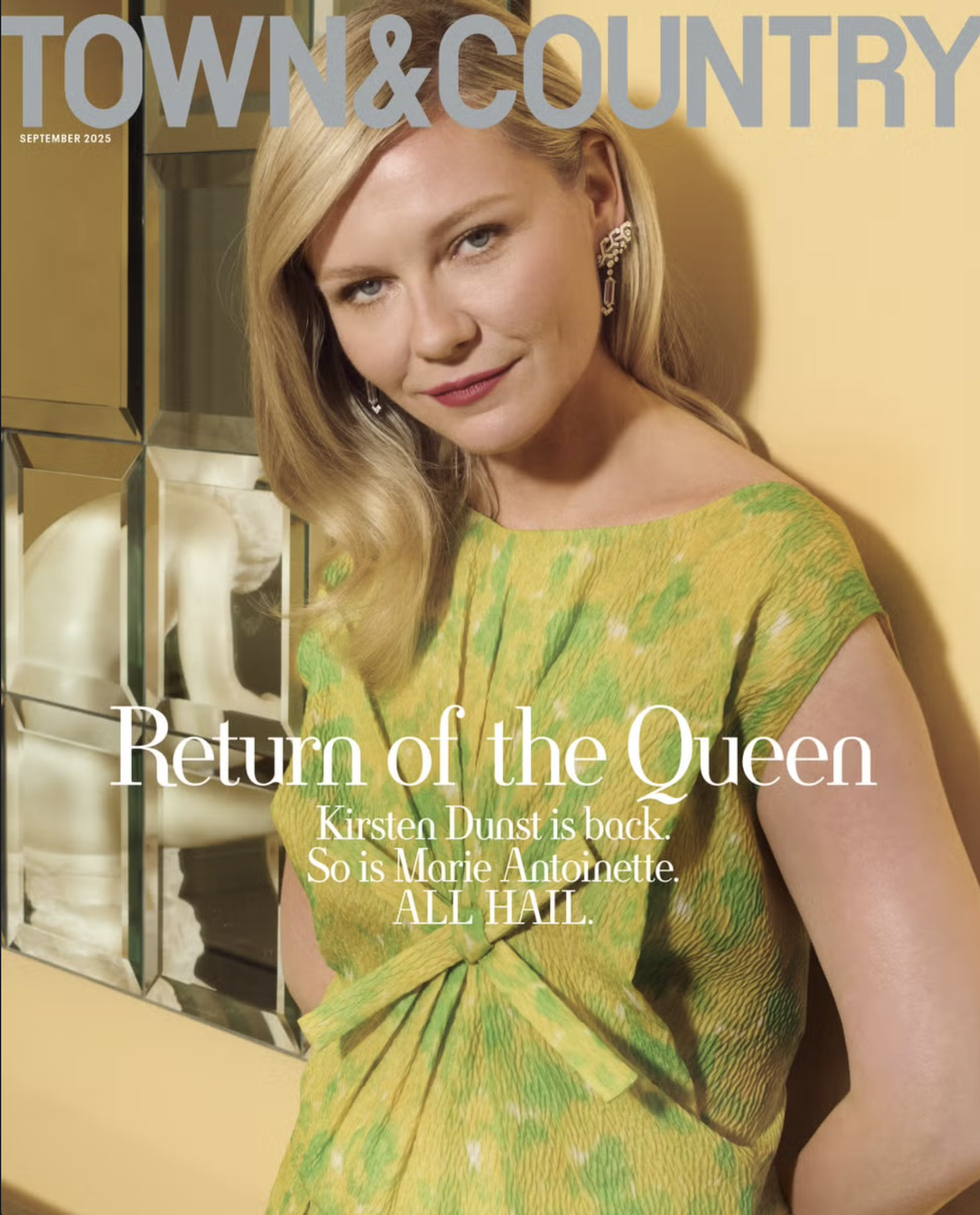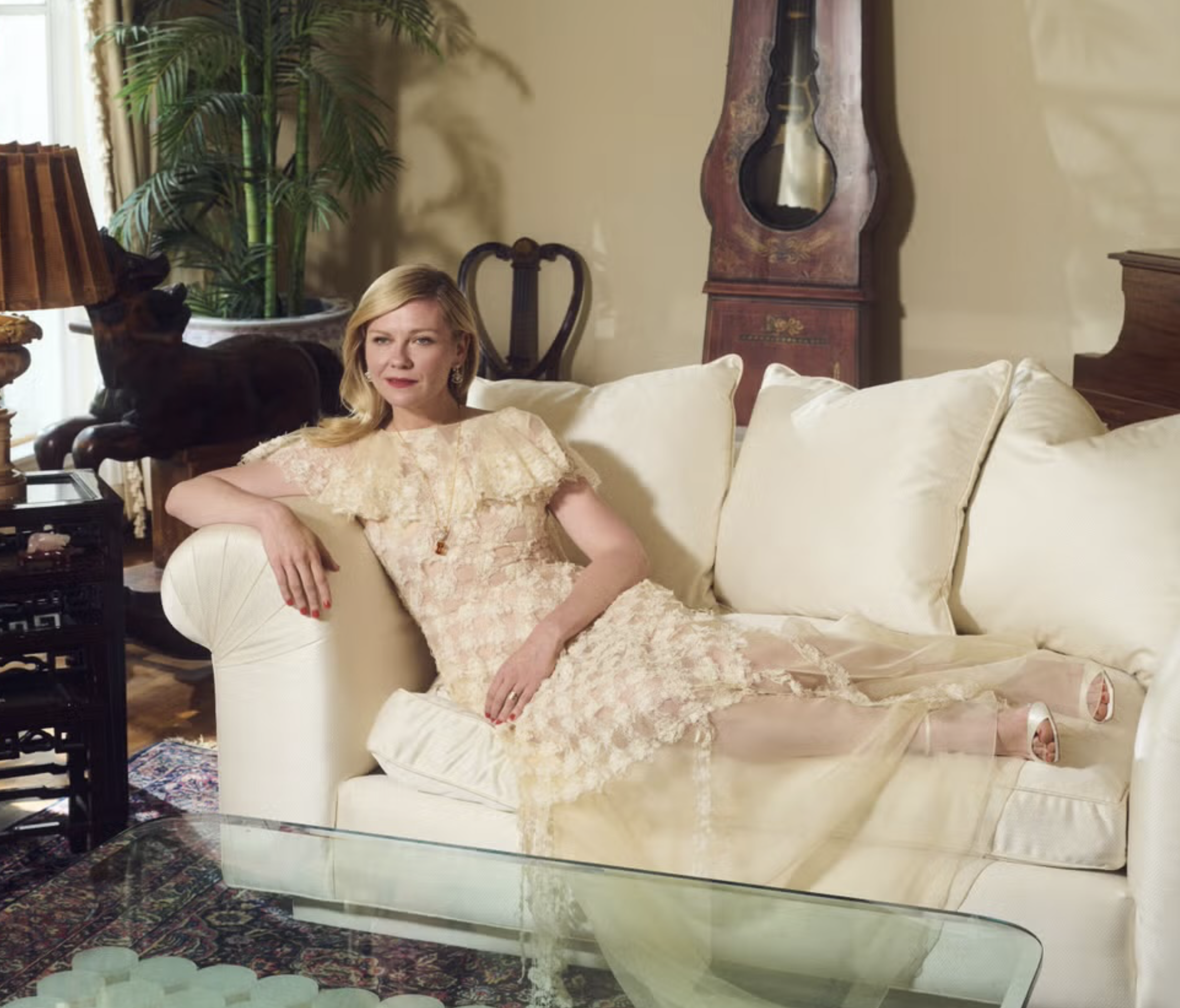Kirsten Dunst in Town & Country Prompts a Look at Marie Antoinette's White Women World
/Kirsten Dunst in Town & Country Prompts a Look at Marie Antoinette's White Woman's World AOC Fashion
Hollywood actor Kirsten Dunst covers the September 2025 issue of Town & Country [IG], interviewed by Mickey Rapkin in ‘Cool Girl Colossus’. Dunst is styled by Deborah Afshani in images by Tina Tyrell [IG].
Kirsten Dunst stars in the 2025 movie ‘Roofman’, in which she plays a woman who forms a relationship with a criminal hiding out in a Toys ‘R’Us. Channing Tatum plays the criminal, Jeffrey Manchester, who escapes from prison and lives undetected in the toy store for months, but falls for Dunst's character, Leigh.
In her Town & Country interview, Dunst reveals that she just finished reading a script for director Sofia Coppola’s latest film project.
Kirsten Dunst and Sofia Coppola have collaborated on four feature films: The Virgin Suicides [1999], Marie Antoinette [2006], The Bling Ring [2013], and The Beguiled [2017]. Dunst starred in the first three films and had a cameo in the fourth.
A Shallow Dive into ‘Marie Antoinette’
Sofia Coppola's 2006 film, in which Kirsten Dunst played Marie Antoinette, is experiencing a significant re-evaluation by audiences. Initially met with mixed reviews and even boos at the Cannes Film Festival, it is now widely appreciated for its style and unique take on the historical genre.
The Initial Criticism
When the movie was released, critics and some audiences were polarized by its unconventional approach to a period drama.
Like so many topics in global culture, the aspects that initially drew criticism have become the very reasons for Coppola’s ‘Marie Antoinette’ film's resurgence in popularity. Rather than being a flaw, the blend of modern and period elements is now seen as the film's greatest strength. It creates a visually and tonally distinct experience that has earned it a devoted cult following.
Late Emerging Criticism of Economic and Racial Realities in ‘Marie Antoinette’
While there was no serious race-related pushback against the film initially, over time Coppola’s preoccupation with a “privileged white woman’s problems” has become a source of criticism. Even agreeing that Marie Antoinette can be viewed universally, critics and students both insist that Coppola’s world of women is white and preferably rich.
The film was criticized for its sympathetic portrayal of the young queen, minimizing her detachment from the suffering of the French people and reducing the French Revolution to a backdrop. Some saw this treatment as Coppola, a child of privilege herself, sympathizing with another wealthy, out-of-touch women.
When the director’s 2017 film ‘The Beguiled’ was released sans the Black characters who were present in the original source material, there was nothing that white women like Anne could say with conviction. Coppola was either clueless or deliberate in her decision to cast only white people in the film, according to critics.
My point is that the idea of not writing Black charcters out of movies was not a hush, hush topic when ‘The Beguiled’ decision was made. And Prada was not alone. As always AOC tried to walk both sides of the issue while being honest about the facts. When Gucci was getting creamed over a jacket that Beyonce had already worn at a photo-op, AOC cried foul.
Anne was Hit with an Intellectual Brick in 2011
This reality of emerging perceptions about the fault lines between white women and all women of color hit Anne like a bulldozer at a Hunter College conference in October 2011, marking the 20th anniversary of the Clarence Thomas confirmation hearings and Anita Hill’s role in trying to stop the Thomas train in its tracks.
I was stunned after changing my press seat at the event, moving instead to sit with the students in the balcony. When Gloria Steinem introduced her close, forever friend Anita Hill, I was the only person among the students, who clapped for Steinem.
Fair or not, it was my observed reality that the Hunter students in my seating vicinity in the balcony loathed Gloria Steinem. Our fractures have only become deeper almost 15 years later, at a time when we can’t win without being focused on the biggest sources of danger to American democracy.
It’s not the big, bad white woman, your version of the racist, privileged creature — no matter what she says in public and how she votes — imperfect human who is against you, Gen Z. You have far bigger assemblies of people committed to your demise.
You can turn her into a caricature in a workout class, and punch away to release your frustration and aggression. But she is not your real problem in life, Gen Z. And you are dead wrong probably 60% of the time in how you blackwash her.
There are plenty of racist, white women in America, but I’m not one of them. Nor is Abigail Spanberger running for governor of my Virginia on November 24, with mail-in voting starting in a couple weeks. Nor is Mikie Sherrill running for governor of New Jersey in 2025’s other critical election, your enemy.
They are preferable alternatives for your futures, my fellow citizens.



